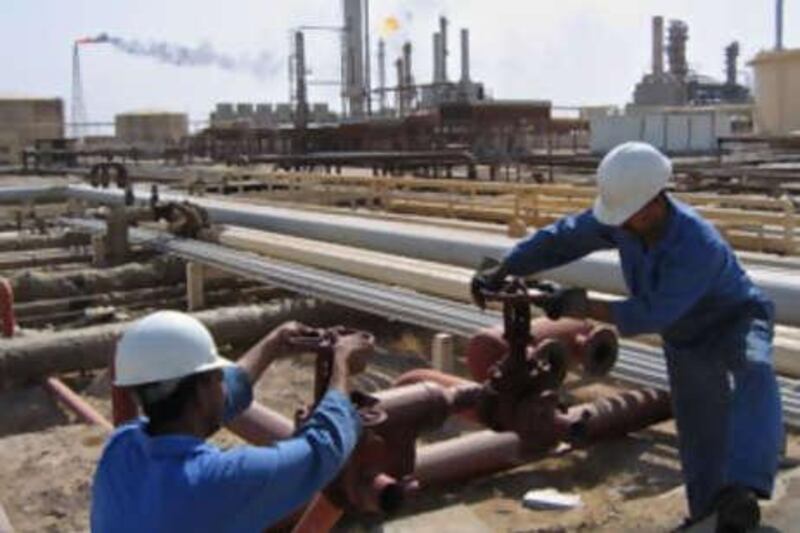As analysts warn that global oil demand may actually be falling, not just slowing, Opec will consider cutting oil production in two stages in an effort to eliminate about two million barrels per day (bpd) of surplus supply. Global oil consumption probably fell in the third quarter from a year earlier, and may show a full-year contraction for the first time in 15 years, the London-based Centre for Global Energy Studies said today. "The oil bubble has well and truly burst," it said in a report published days before Opec's emergency meeting on Friday. In televised comments yesterdaynight, the Opec president Chakib Khelil said there was "no doubt" the organisation's members agreed on the need to cut production. "It is very likely that we will take a reduction decision this time and another decision later on to ensure price stability," he said. "All members agree that oil inventories are very high and supply is higher than demand by around two million bpd." The 13-nation group could hold a further meeting ahead of its regular Dec 17 gathering in Oran, Algeria, at which it may consider the need for further cuts based on how oil prices respond to the group's October decision, Mr Khelil added. While dismissing calls by some western governments to avoid production cuts that might worsen the world economic climate, Mr Khelil said Opec would consider other countries' needs. "We need to be ready to stabilise the market in co-operation with non-Opec countries," he said. "All the needs of consumer countries will be fully satisfied because Opec members want not to see the global economy deteriorating as it is now." The expected production quota cuts would be Opec's first in almost two years. The organisation last trimmed its members' quotas at a Dec 2006 meeting in Abuja, Nigeria, where it announced a 500,000 bpd reduction that took effect in Feb 2007, following a 1.2 million bpd cut the previous October. The organisation's ministers will deliberate on Friday as the group faces the weakest growth in oil demand since 1993, just as a number of major new oil projects are being brought on stream. Recent oil production increases in Nigeria, due to a downturn in civil unrest in that country, and repairs to US offshore oil facilities damaged by hurricanes could also exacerbate the supply glut. Slowing economic expansion is contributing to the sluggish prospects for oil demand growth. Earlier this month, the International Monetary Fund predicted that growth of the world's industrialised economies would slow next year by a percentage point to 0.5 per cent, posting its weakest performance since 1982. The agency also forecast a 16-year high in US unemployment next year. Some analysts say oil prices could fall below $50 a barrel before the end of this year - an abrupt about-face from some spring forecasts of $200 or more. "If the US, Europe and Japan go into a major recession, there's no reason we cannot see $35," Mark Pervan, a senior commodity strategist with ANZ Bank in Melbourne, Australia, told Associated Press. Goldman Sachs and Merrill Lynch analysts said oil prices could drop a further 44 per cent from their summer all-time peak to about $40 a barrel if the global economy slips into recession. At one stage today the price of crude for November delivery recovered to $74 a barrel on the New York Mercantile Exchange on expectations that Opec would cut quotas, after touching a 16-month low of $68.57 last week. Oil futures peaked at $147.27 in July. Nonetheless, investors have shrugged off last month's roughly 520,000 bpd reduction in Opec output, amid news of rising oil inventories, falling retail sales and slowing housing starts in the bellwether US economy. tcarlisle@thenational.ae
Opec considers production cut
A two-stage reduction of two million barrels per day may be agreed upon during group's emergency meeting on Friday.

Editor's picks
More from the national




